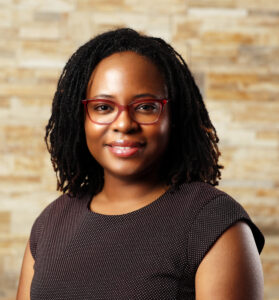RALEIGH — Campbell Law School Assistant Dean of Career and Professional Development Kala Taylor recently participated in a panel discussion hosted by the Triangle Business Journal on the “Future of Employment” in a post-Covid world.

She was joined by Molly Galloway, chief strategy officer with human resources consulting organization Catapult; Susie Gibbons, partner and chair of the Employment and Benefits Group with Poyner Spruill LLP law firm; and Randi Seran, vice president of human resources for ChannelAdvisor, an e-commerce software company. The panel discussion was moderated by Jason Christie, the president and publisher of Triangle Business Journal.
The panel focused on issues surrounding returning to work after the modern workforce was upended like never before during 2020 due to the pandemic. The panelists discussed how they think the workplace will change, legal issues that could arise with vaccine and mask mandates, issues of equity, inclusion and gender and how leadership will need to adapt to a changing workforce, among others.
The pandemic required workers to be more vulnerable with their bosses and share personal challenges, obligations and even health concerns as personal lives crossed into business obligations, according to the TBJ article.
As the pandemic subsides in the U.S. and companies consider bringing employees back to the office, we cannot forget what we learned about one another, Taylor said as part of the panel.
Taylor described Covid during the panel as a home invasion. “Work invaded our homes without an invitation,” she explained, and now that employers are bringing people back into the office, they cannot turn a blind eye to what they have learned about their employee’s responsibilities at home.
Women tend to be caregivers, so any reentry plan disproportionately affects working women. “They have the same responsibilities they had before Covid and some of them have picked up more responsibilities,” which employers need to consider in their reentry plan, she added.
Taylor pointed to a Deloitte study of women taken from November to March of 2021 that revealed nearly 80% of women said their workload had increased at home and at work. Job satisfaction dropped by 29%. More concerning to employers, 57% of women said they planned to leave their job in the next two years. Only 4% of women said they were in a workplace where they felt supported with childcare, time off and mental health resources. “Every person is diverse and everyone has needs,” Taylor explained. “Employers should consider letting employees speak to the reentry plan.”
From her perspective in higher education, Taylor said recent college and professional school graduates have become accustomed to wellness as part of their education experience, and they will expect it in the workforce.
Being a leader in a more flexible work environment may require rethinking how we measure work, Taylor continued. “There is this thought that work only happens when it is seen,” she said. “Do we measure it by presence or do we measure it by outcomes? Future leaders will focus on outcomes.”
To read the digital section of the panel discussion, visit this link. If you were unable to attend, or would like to rewatch the event, visit this link with the passcode: $0Fu&?ce
ABOUT CAMPBELL LAW
Since its founding in 1976, Campbell Law has developed lawyers who possess moral conviction, social compassion, and professional competence, and who view the law as a calling to serve others. Among its accolades, the school has been recognized by the American Bar Association (ABA) as having the nation’s top Professionalism Program and by the American Academy of Trial Lawyers for having the nation’s best Trial Advocacy Program. Campbell Law boasts more than 4,300 alumni, who make their home in nearly all 50 states and beyond. In 2021, Campbell Law is celebrating 45 years of graduating legal leaders and 12 years of being located in a state-of-the-art facility in the heart of North Carolina’s Capital City.

